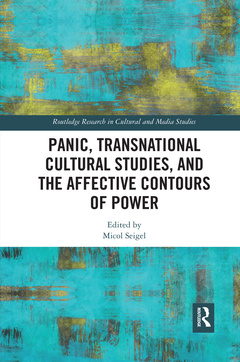Panic, Transnational Cultural Studies, and the Affective Contours of Power Routledge Research in Cultural and Media Studies Series
Coordonnateur : Seigel Micol

This volume explores the panic that is a central affective register of our current international order. Fears of Somali pirates, "Gypsy" kidnappers, African warlords, Ebola, "Mexican meth," pimps, coyotes, gangs, climate refugees and more, structure the dark side of a metropolitan unconscious. These are terrors over things that (might) cross borders, threatening the sanctity of territoriality and capital. Inspired by scholarship challenging panics around human and sex trafficking, the contributors to this volume develop the umbrella category of the global moral panic. Embracing the challenge of grasping a phenomenon not previously regarded as cohering, they consider panics provoked by travel, passage, transgression; panics over bodies that move. Like panics over trafficking, the episodes narrated here ride and feed a field of common sense regarding crime, rights, and state power. Their logics of victims and villains nourish notions of the centrality of punishment, drawing from and feeding taxonomies of gender, race, and nation, solidifying the order craved by capital. They spotlight the coloniality of power, the ongoing salience of empire, the savior logics of rescue, and the profound sexism organizing hierarchies of bodies and places. Panic, this volume diagnoses, is a crucial, undertheorized facet of contemporary local-global relations.
Acknowledgements
List of Figures and Captions
List of Contributors
Introduction, Micol Seigel
Part I. The Coloniality of Panic
Chapter 1: Privateers and Public Ends: Piracy as Global Moral Panic- Jatin Dua
Chapter 2: Moral Panic versus Moral Blindness: Responses to Children’s Militarization in Uganda and the US- Michelle Moyd, Frances M. Clarke, and Rebecca Jo Plant
Chapter 3: Ebola: Keywords- Adia Benton
Chapter 4: A Panicky Atmosphere: On the Coloniality of Climate Change- Alex Chambers
Chapter 5: The Panic over Human Smuggling: From the Nineteenth Century Coolie Trade to Today’s Migrants- Elliott Young
Part II. Too Mobile: Panic at the Borders
Chapter 6: Rescuing the Blonde Angel: The Global Captivity Narrative and the Panic of 2013- Susan Lepselter
Chapter 7: The Everywhere Drug War: Narcoterror and the Global Flows of the Methamphetamine Imaginary- Travis Linnemann and Kyra Martinez
Chapter 8: Black Bodies, Wrong Places: Rolezinho, Moral Panic, and Racialized Male Subjects in Brazil- Osmundo Pinho
Chapter 9: Circulating Sin: Sailors and Benevolence in Early Nineteenth-Century New York- Dana Logan
Chapter 10: Transnational Securityscapes: Central American (Immigrant) Youth and the ‘Military Option’- Elana Zilberg,
Part III. Resisting Rescue: Sex/Work
Chapter 11: Stop the Woman, Save the State: Policing, Order, and the Black Woman’s Body- Rudo Mudiwa
Chapter 12: Modern-Day Slavery: The Analogy Problem in Human Trafficking Reform- Julietta Hua
Chapter 13: Saving Love: Compassion, Desire, Violence, and Deceit in Late Capitalism- Courtney Mitchel
Chapter 14: And Still We Rise’: Moral Panics, Dark Sousveillance, and Politics Otherwise in the New New Orleans- Laura McTighe
Micol Seigel is professor of American Studies and History at Indiana University, Bloomington, and the author of Violence Work: State Power and the Limits of Police (Duke University Press, 2018) and Uneven Encounters: Making Race and Nation in Brazil and the United States (Duke, 2009).
Date de parution : 08-2020
15.2x22.9 cm
Date de parution : 06-2018
15.2x22.9 cm
Thèmes de Panic, Transnational Cultural Studies, and the Affective... :
Mots-clés :
Young Men; CDC Case Definition; cultural studies; ISIS Militant; American studies; Dangerous Brown Men; history; Regular Methamphetamine Users; transdisciplinary; Hemorrhagic Fever; mobility; Ebola Infection; capitalism; National Security Council Senior Director; ethnic studies; Black Cisgender; postcolonial studies; Global Moral Panics; neoliberal; Human Trafficking; Jatin Dua; Sex Offender; Michelle Moyd; West African Ebola Outbreak; Frances M; Clarke; Coolie Trade; Rebecca Jo Plant; Black Sailors; Adia Benton; Transatlantic Slavery; Alex Chambers; Universal Adversary; Elliott Young; Blonde Angel; Susan Lepselter; Climate Refugees; Travis Linnemann; Salvadoran Soldier; Kyra Martinez; Dream Act; Osmundo Pinho; Internet News Reports; Dana Logan; Immigrant Soldier; Elana Zilberg; Somali Piracy; Rudo Mudiwa; Liberation War; Julietta Hua; Courtney Mitchel; Laura McTighe



